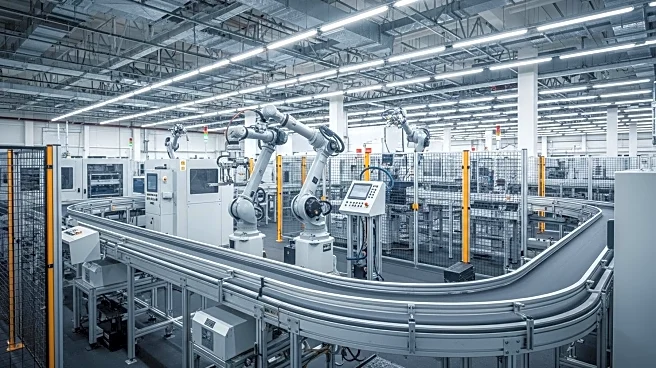What's Happening?
The U.S. manufacturing sector is facing significant challenges due to evolving immigration enforcement policies under the second Trump administration. These policies are contributing to labor shortages in critical industries such as construction and manufacturing. A report from the Brookings Institution highlights that a 'low' immigration scenario could result in a net outmigration of 650,000 individuals by 2025, exacerbating labor force constraints and driving up wages and operational costs. Conversely, a 'high' immigration scenario could stabilize labor markets with net inflows of 1.3 million individuals. The aging U.S. population and declining birth rates further amplify the vulnerability of these sectors, which rely heavily on immigrant workers to maintain economic competitiveness.
Why It's Important?
The implications of these immigration policies are profound for U.S. industries, particularly manufacturing, healthcare, and agriculture, which depend on immigrant labor. Stricter enforcement could disrupt supply chains and increase operational costs, affecting global competitiveness. Companies are responding by prioritizing workforce flexibility, automation, and policy advocacy to secure immigrant labor and stabilize production. These strategies are crucial for maintaining supply chain resilience and mitigating regulatory volatility. Investors are advised to monitor how firms address immigration-related risks, as those with rigid labor models may face heightened exposure to disruptions.
What's Next?
Corporate governance strategies are increasingly focusing on workforce flexibility and policy advocacy. Businesses are recalibrating hiring practices to attract immigrant talent and investing in workforce development programs. They are also lobbying for immigration reforms that grant immigrants full labor rights. Companies in sectors like construction and food production are emphasizing retention strategies and compliance with evolving legal frameworks. Additionally, multinational manufacturers are diversifying workforce strategies, expanding recruitment beyond traditional immigrant corridors, and investing in automation to reduce reliance on manual labor.
Beyond the Headlines
The broader shift in corporate governance reflects a view of immigration as a strategic asset for long-term resilience. Companies are integrating AI-driven logistics systems to offset labor shortages while maintaining output levels. This approach not only addresses immediate labor disruptions but also positions firms for future competitiveness. As policy debates continue, the ability to adapt to shifting labor landscapes will be crucial for global manufacturers.









